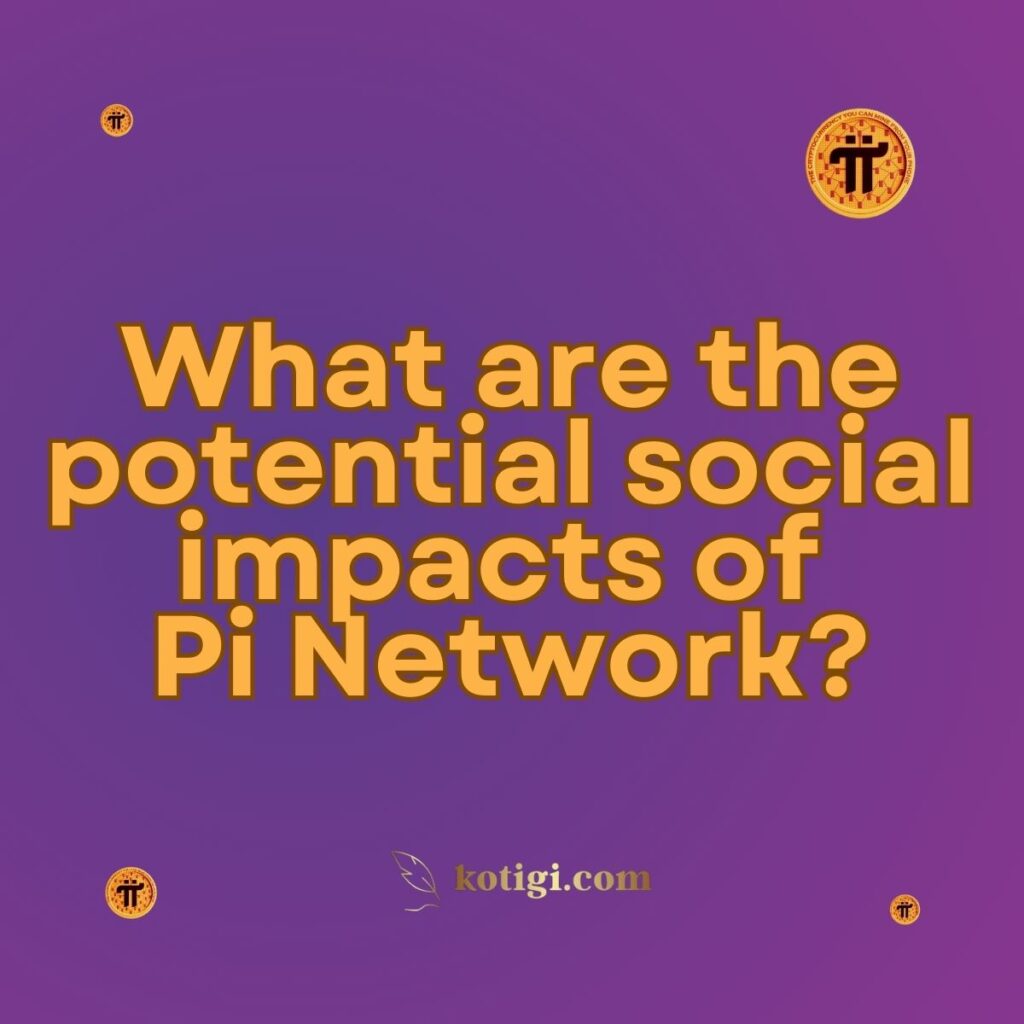
What are the potential social impacts of Pi Network?
The Pi Network has the potential to make significant social impacts by promoting financial inclusion, fostering economic empowerment, and decentralizing global financial systems. With more than 50 million users, Pi offers a platform where the unbanked can participate in the digital economy, opening doors for economic participation and education, particularly in developing regions. However, the platform must navigate ethical concerns such as privacy, exploitation, and fairness to maximize its potential and ensure equitable outcomes.
Introduction
The rise of digital currencies has created both opportunities and challenges for societies across the globe. Pi Network, with its mission to make cryptocurrency mining accessible to everyone, has set itself apart from traditional financial systems. Through its mobile-friendly design, Pi Network has the potential to significantly influence social structures, particularly for communities that have historically been excluded from traditional banking services.
One of the most compelling aspects of Pi Network is its potential social impact. Its promise of low-cost, decentralized transactions could transform economies by enabling financial inclusion and providing new opportunities for people in underbanked regions. Additionally, Pi Network’s design fosters a global community of users who are united not only by the currency but also by shared values of decentralization and collaboration. However, to achieve its potential, Pi Network must navigate various challenges, particularly in ensuring ethical practices and mitigating risks related to privacy, exploitation, and fairness.
This post explores the potential social impacts of Pi Network in detail, examining how it could reshape financial inclusion, empower communities, decentralize financial systems, build global connections, and contribute to digital literacy. We will also explore the ethical concerns that arise as Pi Network grows and its user base expands.
Table of potential social impacts of Pi Network
| Social Impact Area | Description | Potential Benefits | Challenges / Considerations |
|---|---|---|---|
| Financial Inclusion | Pi Network allows users to mine cryptocurrency through smartphones, providing access to digital finance for unbanked populations. | Low-cost transactions and accessible financial tools for individuals in regions with limited banking infrastructure. | Ensuring that access to smartphones and internet is widespread enough to make a substantial impact in rural and underdeveloped areas. |
| Economic Empowerment | Through Pi Network’s reward model, users can earn Pi and participate in the digital economy. | Economic participation for small businesses and individuals who lack access to traditional financial systems, enabling micro-transactions and business growth. | Ensuring fair distribution and preventing wealth concentration as Pi becomes more valuable, especially in emerging economies. |
| Decentralization | Pi Network provides a decentralized platform, reducing reliance on central financial institutions. | Encourages peer-to-peer transactions, promoting self-sustaining localized economies that rely on community trust networks. | Maintaining security and privacy while enabling large-scale decentralized operations; protecting users from fraud and exploitation. |
| Global Community Building | The platform fosters a global community through security circles and interactions within the app, encouraging collaboration across borders. | Strengthens cultural exchange, cross-border partnerships, and global economic collaboration; promotes a shared sense of purpose and mission. | Managing language barriers, cultural differences, and ensuring inclusivity for all users regardless of their region or background. |
| Education and Digital Literacy | Pi Network introduces users to blockchain technology and digital finance, encouraging self-learning and exploration in a decentralized financial space. | Enhances financial literacy and digital skills, especially for younger generations and people in developing countries, potentially reducing the digital divide. | Creating effective educational resources and outreach strategies that resonate with diverse communities and varying literacy levels. |
| Sustainability and Energy Usage | Pi’s mobile-based mining is designed to be energy-efficient, which sets it apart from traditional mining methods like Bitcoin’s Proof of Work (PoW). | Reduces environmental impact, making Pi a more sustainable alternative in the cryptocurrency space while being accessible to a broader audience. | Ensuring that sustainability claims are measurable and transparent to avoid greenwashing concerns; scalability without energy compromises remains a long-term challenge. |
| Ethical Considerations | The platform must address data privacy, fair usage, and equitable distribution to avoid creating new inequalities or perpetuating existing ones. | Ethical use of data, protection of user privacy, and equitable access to the Pi network can build trust and foster long-term, responsible engagement with the platform. | Navigating complex legal and ethical regulations, especially across different countries, while maintaining user privacy and preventing exploitation or abuse of the platform. |
Table Explanation:
This table outlines how Pi Network has the potential to create meaningful social change, providing financial empowerment and access to blockchain technology. Each row highlights a key area of impact, the potential benefits it can bring, and the challenges or considerations Pi Network will need to address to maximize its positive social impact.
1. Financial Inclusion
One of the most significant potential impacts of Pi Network lies in its capacity to promote financial inclusion, particularly for individuals in developing countries who may lack access to traditional banking services.
1.1 Accessible Mining via Smartphones
Pi Network enables users to mine cryptocurrency using only their smartphones. This mobile-first approach makes mining accessible to anyone with a mobile device, allowing users in regions with limited access to technological infrastructure to participate in the cryptocurrency ecosystem. Traditional cryptocurrency mining requires high computational power, making it inaccessible to the average user, but Pi Network circumvents this barrier.
By lowering the entry threshold, Pi Network opens the door to financial participation for millions of people who might otherwise be excluded from digital finance. This is especially important in developing economies, where banking infrastructure is often lacking but mobile phone usage is widespread. The ability to mine Pi through smartphones democratizes access to cryptocurrency, offering users an easy way to enter the global financial system.
1.2 Opportunities for the Unbanked
According to the World Bank, around 1.4 billion adults remain unbanked globally, and many of these individuals are in regions with low financial inclusion rates. Pi Network’s decentralized model can offer a financial alternative to the unbanked population by providing access to digital assets without needing a bank account. For people in remote or underserved areas, where opening a bank account may be difficult or impossible, Pi offers a way to store, send, and receive value.
The decentralized nature of Pi Network ensures that users can participate in economic activities without depending on traditional financial institutions. This could be a game-changer in developing countries, where financial institutions often fail to serve vast portions of the population. Additionally, the network’s low fees and user-friendly platform could make Pi an attractive option for cross-border transactions, especially for migrant workers who need affordable and efficient remittance services.
1.3 Reducing Transaction Fees
Another barrier to financial inclusion is the high cost of transaction fees associated with traditional financial services and remittances. For people in low-income countries, these fees can represent a significant percentage of the money they are trying to send or receive. Pi Network’s decentralized structure eliminates the need for intermediaries, allowing for peer-to-peer transactions at much lower costs.
By offering low-cost financial services, Pi Network can empower users to participate in the global economy without the burden of expensive transaction fees. This has the potential to significantly improve economic outcomes for individuals and small businesses in developing regions, where high transaction costs often act as a barrier to economic participation.
2. Economic Empowerment
In addition to fostering financial inclusion, Pi Network has the potential to empower individuals economically by providing new opportunities for income generation and supporting local businesses.
2.1 Earning Pi as a Reward
Pi Network offers its users the chance to earn Pi coins by contributing to the platform, such as verifying transactions or securing the network through “security circles.” These activities allow users to accumulate Pi without requiring financial investment. For people in regions with high unemployment or limited access to formal jobs, this presents an opportunity to earn digital assets that could potentially hold significant value.
By enabling users to earn cryptocurrency through active participation, Pi Network empowers individuals to generate income in new and innovative ways. As the value of Pi grows, these earnings could become an important source of income for many, especially in regions where earning opportunities are scarce.
2.2 Supporting Small Businesses
Small businesses and entrepreneurs could benefit significantly from the Pi Network ecosystem. By accepting Pi as a form of payment, businesses can bypass traditional financial intermediaries, reducing transaction costs and increasing profitability. In regions where banking services are either expensive or unreliable, the ability to conduct transactions in Pi could offer a vital alternative.
For example, small businesses that sell products internationally often struggle with the costs and complexities of foreign exchange and international wire transfers. Pi’s decentralized system could provide a seamless, low-cost solution for these businesses, enabling them to participate in the global market without the typical financial hurdles.
2.3 Creation of New Job Opportunities
As Pi Network continues to grow and develop its ecosystem, new job opportunities are likely to emerge. Positions related to blockchain development, cryptocurrency management, decentralized finance (DeFi), and security will be in demand. This could spur the growth of a new economic sector that provides jobs for developers, cybersecurity experts, and entrepreneurs interested in building decentralized applications (dApps) on the Pi platform.
These new job opportunities could benefit people in both developed and developing countries, furthering the economic empowerment potential of Pi Network. Moreover, as more people become involved in the Pi ecosystem, the knowledge and skills gained through participation could open up additional career opportunities in the broader tech and finance sectors.
3. Decentralization of Financial Systems
Pi Network offers a decentralized model of finance that shifts power away from traditional financial institutions and towards the individual. This shift has significant social implications, as it empowers users to control their own financial assets without relying on intermediaries.
3.1 Reducing Dependency on Banks
Traditional banking systems hold significant power over individuals’ access to financial services. Pi Network challenges this by offering an alternative that does not require users to interact with banks or centralized financial institutions. This reduced dependency could be particularly impactful in regions where banking services are either inaccessible or unreliable.
By enabling users to store, transfer, and spend their digital assets directly, Pi Network offers a degree of financial independence that is difficult to achieve within the traditional banking system. For marginalized communities that have historically been excluded from financial systems, this decentralized model provides a new pathway to economic empowerment.
3.2 Peer-to-Peer Transactions
One of the key features of Pi Network is its peer-to-peer transaction model. By allowing users to send and receive Pi directly from one another, the platform eliminates the need for third-party intermediaries, such as banks or payment processors. This not only reduces transaction fees but also increases the speed and efficiency of transactions.
In regions where access to banking services is limited or where international transfers are costly and slow, the ability to conduct peer-to-peer transactions could provide a critical financial lifeline. This decentralized transaction model also makes it easier for users to transact across borders, further promoting economic inclusion and global financial participation.
3.3 Empowering Localized Economies
The decentralized nature of Pi Network could also support the development of localized economies. Communities that adopt Pi as a form of currency could create their own self-sustaining economic systems, with individuals and businesses transacting in Pi without relying on external financial institutions. This could be particularly beneficial in regions where the national currency is unstable or where access to traditional financial services is limited.
By fostering the growth of decentralized, community-driven economies, Pi Network has the potential to empower individuals and communities to take greater control of their financial future.
4. Building Global Communities
Pi Network is not only about financial empowerment; it is also about creating a global community of users united by shared goals and values. As the platform continues to grow, its social impact could extend beyond financial transactions to include cultural exchange, trust-building, and the development of global solidarity.
4.1 Building Trust Networks
One of the unique features of Pi Network is the concept of “security circles,” where users build small, trusted groups to secure the network. These trust networks serve a dual purpose: they ensure the security of the network while fostering a sense of community and mutual responsibility among users.
In a world where trust in institutions is declining, Pi Network’s peer-based trust model offers an alternative. By building personal networks of trust, users become more invested in the platform and in one another, creating a stronger sense of community.
4.2 Promoting Cultural Exchange
Pi Network’s global reach allows users from different cultural, geographic, and socioeconomic backgrounds to interact and collaborate. This promotes cultural exchange and broadens users’ perspectives, as they engage with people from around the world who share a common interest in decentralized finance.
Through these interactions, Pi Network has the potential to foster greater understanding and cooperation among its global user base, contributing to a more interconnected and culturally aware world.
4.3 Strengthening Global Solidarity
As users from diverse backgrounds join Pi Network, they become part of a larger movement that challenges traditional financial systems and promotes the values of decentralization, inclusion, and empowerment. This sense of shared purpose could strengthen global solidarity, as users collaborate to build a more equitable and decentralized financial future.
5. Education and Digital Literacy
Pi Network also has the potential to educate users about blockchain technology, cryptocurrency, and digital finance. By participating in the network, users can gain valuable knowledge and skills that could be applied to other areas of their lives, contributing to broader digital literacy.
5.1 Blockchain Education
For many users, Pi Network may serve as their first introduction to blockchain technology. By engaging with the platform, users can learn about how blockchain works, the principles of decentralized finance, and the role of consensus mechanisms in securing networks. This practical experience with blockchain technology could help users build a foundational understanding of digital finance, which could be applied to other areas of their lives or future career opportunities.
5.2 Empowering Youth
Young people, particularly in developing regions, stand to benefit greatly from the educational opportunities provided by Pi Network. As they participate in the platform, they gain valuable skills in digital finance, blockchain technology, and decentralized applications, which could open up future career opportunities in the tech and finance industries.
By providing a practical, hands-on way to learn about cryptocurrency and decentralized systems, Pi Network has the potential to empower the next generation of digital innovators and entrepreneurs.
5.3 Promoting Financial Literacy
In addition to teaching users about blockchain, Pi Network also promotes financial literacy by providing a platform where users can manage digital assets, send and receive payments, and participate in decentralized finance. By gaining experience with these tools, users can develop a better understanding of how to manage their own finances in the digital age.
6. Ethical Considerations
While Pi Network offers many potential benefits, it also raises important ethical considerations that must be addressed to ensure that its social impact is positive.
6.1 Data Privacy Concerns
One of the key ethical concerns with any digital platform is how it handles user data. Pi Network must ensure that it protects users’ privacy and maintains transparency about how data is collected and used. Failure to address privacy concerns could undermine trust in the platform and limit its ability to achieve widespread adoption.
6.2 Risk of Economic Exploitation
There is also a risk that vulnerable populations could be exploited if they are not adequately informed about the risks and rewards of participating in cryptocurrency ecosystems. For example, users in developing regions may be more susceptible to scams or misinformation, particularly if they lack experience with digital finance. Pi Network must take steps to educate users and provide clear, accurate information about the risks involved in participating in the platform.
6.3 Ensuring Equitable Access
Another ethical consideration is ensuring that access to Pi Network is equitable and that no group is disproportionately advantaged or disadvantaged. Early adopters, for example, may accumulate more Pi than later users, potentially creating inequalities within the platform. Pi Network must ensure that its rewards structure is fair and that all users have an equal opportunity to benefit from the platform, regardless of when they join or where they are located.
Conclusion
Pi Network has the potential to make a profound social impact by democratizing access to cryptocurrency, promoting financial inclusion, and decentralizing economic power. Its focus on mobile mining, economic empowerment, and decentralized governance could reshape how people interact with digital finance. However, to maximize its potential, the platform must address important ethical concerns, particularly related to data privacy, exploitation, and fairness.
Pi Network is not just a technological innovation; it is also a social experiment that could redefine the way people participate in the global economy. By providing access to digital assets for millions of people who have been excluded from traditional financial systems, Pi Network offers a vision of a more inclusive and equitable financial future.
Key Takeaways
- Financial Inclusion: Pi Network offers an accessible way for unbanked populations to participate in the global economy by mining cryptocurrency through smartphones.
- Economic Empowerment: Users can earn Pi coins by contributing to the network, opening up new opportunities for income generation and supporting local businesses.
- Decentralization: Pi Network challenges traditional financial systems by offering a decentralized, peer-to-peer transaction model that reduces dependency on banks and financial intermediaries.
- Global Community: Pi Network fosters a global community of users united by shared goals and values, promoting cultural exchange, trust networks, and global solidarity.
- Education: By participating in Pi Network, users gain valuable skills in blockchain technology, digital finance, and decentralized applications, contributing to broader digital literacy.
- Ethical Considerations: The platform must address ethical concerns related to data privacy, the risk of economic exploitation, and ensuring equitable access to its benefits.




